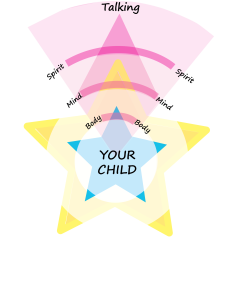Talking


Talking includes speech, articulation and voice.
- Speech: the verbal sounds you make when communicating a message.
- Articulation: the physiological movements involved in producing the speech sounds.
- Voice: the sound made when air passes through the vocal folds, causing them to vibrate.
The Talking Body
It’s a miracle that any of us can speak at all, really, when you consider all of the physical mechanisms that have to be in working order to say even the most basic speech sound, like “ah.” Think about it. What is your mouth doing when you say, “ah?” How about your articulators: lips, jaw, teeth, tongue, velum, and roof of your mouth? How about your larynx, cheeks, diaphragm, rib cage, and lungs? And what about all of those muscles, nerves, ligaments, tendons, arteries, veins, capillaries, and your blood?
What if you didn’t drink water for 5 days in the desert? What would that do to your blood chemistry? How would that affect your articulators? I hope you don’t find out the hard way!
In order for everything to work properly, all of the interacting body systems (nervous, musculoskeletal, circulatory, respiratory, gastrointestinal, integumentary, urinary, reproductive, immune, and endocrine) need to be feeling up to speed, so if you want to be a good speaker, how well you take care of yourself does make a difference.
The Talking Mind
The body alone can’t produce speech sounds—especially not in the incredibly coordinated way that real talking requires. The body needs a healthy brain to tell it what to do, how to do it, and when to do it.
Aren’t you thankful that the mind does most of its work automatically? Wow! If we had to think through every step of the talking process, we wouldn’t be saying much at all…unless the body just took off by itself, as what happens with reflexes (e.g., hiccupping, gagging), but I wouldn’t call that talking, would you?
For an informal, illustrated explanation of how the Talking Mind works, you are invited to get a free download here.
The Talking Spirit
Talking doesn’t require a healthy spirit, but having a healthy spirit sure does make speaking worth all the effort.
You can detect a healthy spirit in another’s voice. It happens when they sing, chant, hum, laugh, cry, whistle, and make nature calls and noises. You can hear the Spirit of a person through their feelings, based on the tone of their voice.
God understands what people say, even when others can’t, as when speaking in tongues (1 Cor. 14:2).
The Spirit of Talking helps us connect with God, with each other, with animals and nature, even when words aren’t available.
If you are a parent, grandparent, or other caregiver and want to encourage a child to grow in speech, language or literacy development, the Reading and Speech Clinic can help. Let’s begin by email by signing up for a free mini-assessment. By participating, you will discover your child’s precious gems in the areas of Talking, Listening, Expressing, Reading, Writing, Mind, Body, and Spirit. You will find out which gems are currently shining in your child, and which ones might need a bit more polishing. Start
